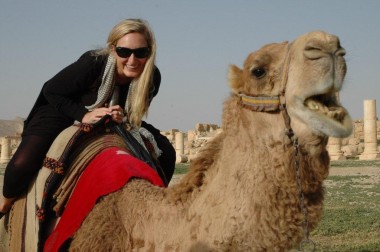“One thing that has always struck me is this incredible resilience that children and people have. It’s why we call them survivors and not victims. They come from incredibly traumatic situations and they often times need to go through a long period of trauma recovery, and we support them with the tools to manage their recovery and move forward with their lives.” Melissa Stewart.
This weeks interview doesn’t deal with a glamorous topic.
It won’t get this blog any likes on Facebook or Instagram, but it needs to be discussed because it matters.
The cruel practice of slavery and human trafficking affects nearly 21 million people globally.
Our next Engaging Woman Melissa Stewart has worked hard to combat the issue for more than a decade.
Here’s what she would like us to know…
Martine Harte: Melissa if you were to meet me at a party how would you describe what you do?
Melissa Stewart: Usually when I meet somebody at a dinner party and describe what I do two things happen;
1/ A blank stare and people start feeling incredibly guilty or
2/ They get really engaged and have usually seen a TV show or article about sex trafficking because that’s what predominates in the media.
I generally don’t use the word trafficking because it’s a very misunderstood word so I usually say I work on labour exploitation of people, child labour and essentially slavery and other child protection issues in the developed world.
Can you simplify it further?
Melissa Stewart: The really simple way of explaining it is by saying trafficking is putting or keeping someone in an exploitative situation – often for profit – that they can’t get out of.
It’s not the slavery of past centuries where people were physically locked up or in chains and legally kept as property. Trafficking and modern-day slavery also can involve the use of more coercive methods and threats or debt bondage to keep people in a situation of exploitation that they cannot escape. For instance when a person pays an enormous upfront fee to get recruited into a job that they then find out will take a life time to pay off. Effectively they are then trapped.
There are a lot of children who work on fishing boats on the Gulf of Thailand who are out at sea for months and months at a time and sometimes come back to shore and aren’t paid, or if they are too sick to work get thrown overboard.
Why did you first decide to enter this field when most of us want to close our eyes and hope it all goes away?
Melissa Stewart: I’ve always had a concern for social justice and rights. Prior to working in a law firm in Canada I studied for a semester in Australia and travelled through South East Asia and became aware of a range of humans rights issues. I became quite passionate about some of the work I could do abroad. I was given an opportunity to work there with the UN environment program on a regional law program. While it was interesting moving from corporate law to the United Nations for a variety of reasons, as soon as I got there it became quite clear quite quickly that the environment wasn’t at the forefront of social issues like it was in Canada.
There were basic human rights issues that were in front of you every single day. You would walk out on the street and see children and mothers begging on the street; you would see women in brothels where it was unclear whether they were being forced to work there or were there of their own consent and you also saw a lot of workers on construction sites who seemingly were not being treated properly. It re-ignited a passion in me for working on human rights issues.
Have you met with victims of trafficking?
Melissa Stewart: One thing that has always struck me is this incredible resilience that children and people have. It’s why we call them survivors and not victims. They come from incredibly traumatic situations and they often times need to go through a long period of trauma recovery, and we support them with the tools to manage their recovery and move forward with their lives.
The hope that they have and the joy they can find in the smallest things, the forgiveness that they have for their situation. Their story may have started off with a really unlucky situation, that led to a horrible situation of violence or neglect, but the resilience of people is really amazing to see. I think that empowers us who are working to fight the good fight as well.
I bet it does. Is there something that when you see this conversation played out within the media is there something you would like to clarify.
Melissa Stewart: It’s often very frustrating – I guess symptomatic of most mainstream media is that they often go for the incredibly sensational story and by doing that often makes the other stories seem less horrific. The majority of trafficking stories are not about somebody who was kidnapped and stolen and taken across borders and ended up locked in chains. The majority of trafficking stories are cases of labour trafficking, not situations of sex trafficking, especially in that east Asia region. That’s one issue that needs to be clarified.
We need to realise people end up in these situations that often start with a family member losing their job or a mother becoming widowed and trying to support her family or some of the kids being pulled out of school for work and ended up being incredibly vulnerable and able to be exploited.
These are really incremental, rational choices that people make in situations of survival and some people have lucky outcomes, some people have unlucky outcomes. So to only focus on the sensational stories misses the point of what the response needs to be… which is improved social protection, improved child protection systems, so that if a family of parent out of work the kids won’t fall through the gaps.
In the Western World we often say, “it’s just a first world problem.” How do you react given what you know about “real problems” does it frustrate you?
Melissa Stewart: That’s a very good question, and sometimes it’s very frustrating but I think it’s important to be respectful on where everybody is on their state of learning on an issue.
We all have our circle of concerns; we have our personal ones, our immediate relationship or family ones and our national ones, onwards. I do find people who have travelled to these regions have more of an understanding of their connectedness in the world I find that people who haven’t left their own neighbourhood barely understand their place in the world and that’s incredibly frustrating.
I’m trying to take some of the guilt out of the issue, so what’s the least we can do to make a difference?
Melissa Stewart: One of the easiest things you can do is think about your purchases, start reading labels, start seeing where things are made.
Asking your local grocer or retailer, what practices they have in place to ensure there’s no child or forced labour in the supply chain. The momentum of having a lot of people ask that means corporates are going to have to take it seriously.
Ten years on, you and I meet for a cuppa, where will you be?
Melissa Stewart: I would hope we’d be living in a world we’re we wouldn’t be fighting to have a battle with corporates over human rights. I hope it’s embedded in the discussion and becomes something share holders: investors, pension funds and governments demand, part of the way we operate in society and that laws are changed to do that.
Personally I hope I don’t have to start at the ground conversation again, I just hope everyone already understands.

Melissa Stewart proving her job can also have a lighter side!
Many thanks Melissa, hope this blog plays a part!
Pop across here if this story has sparked your interest to learn more
